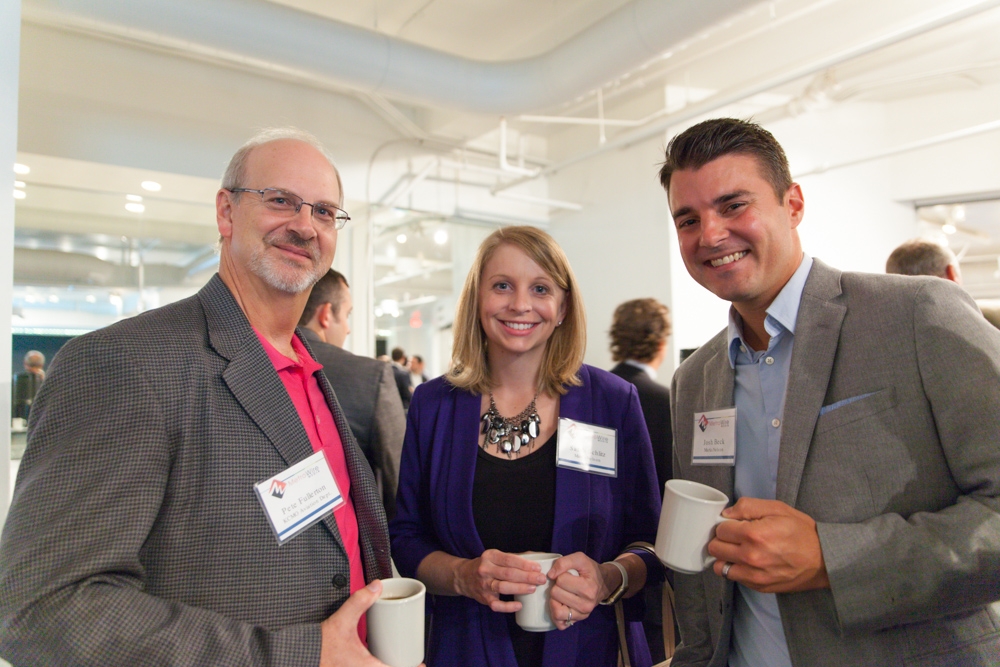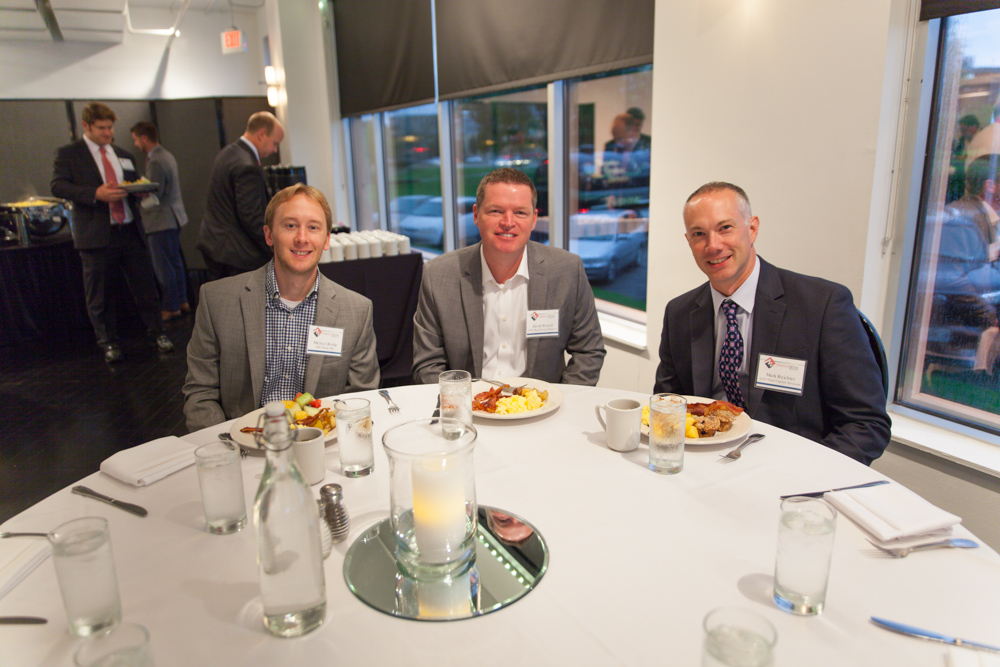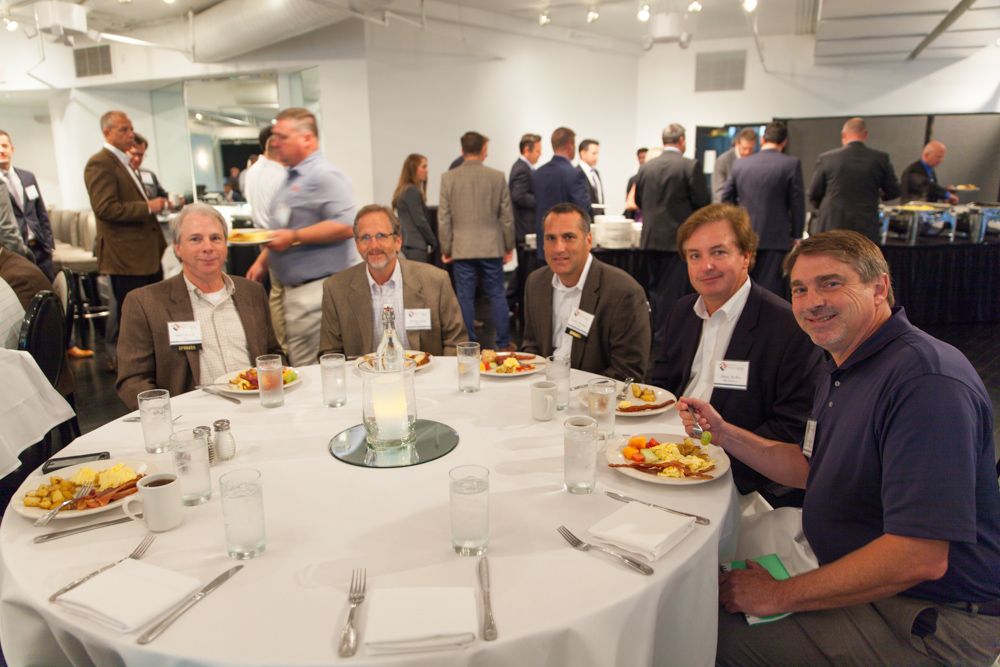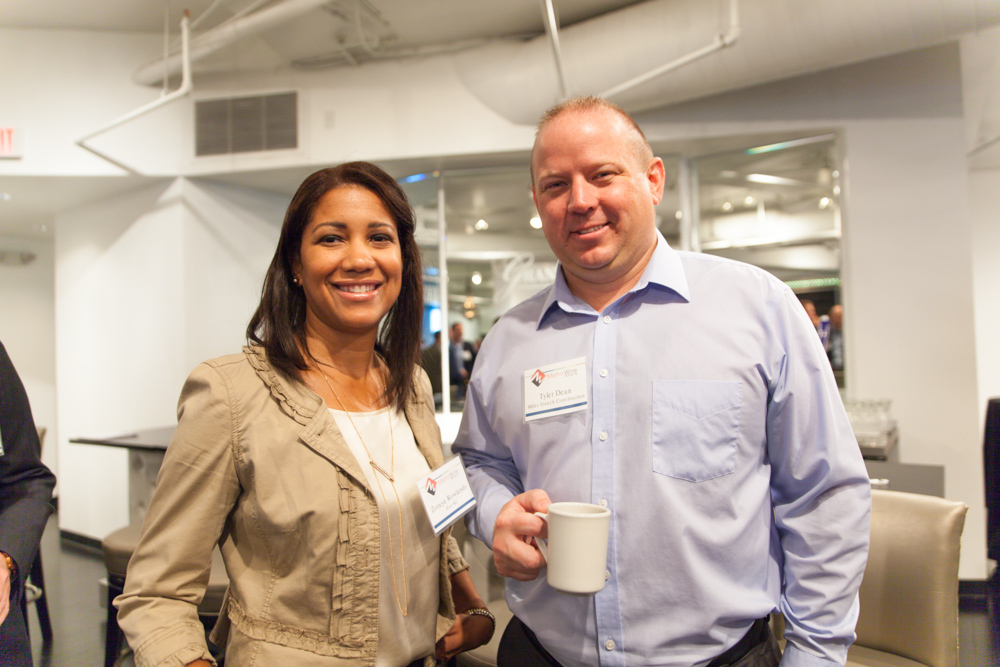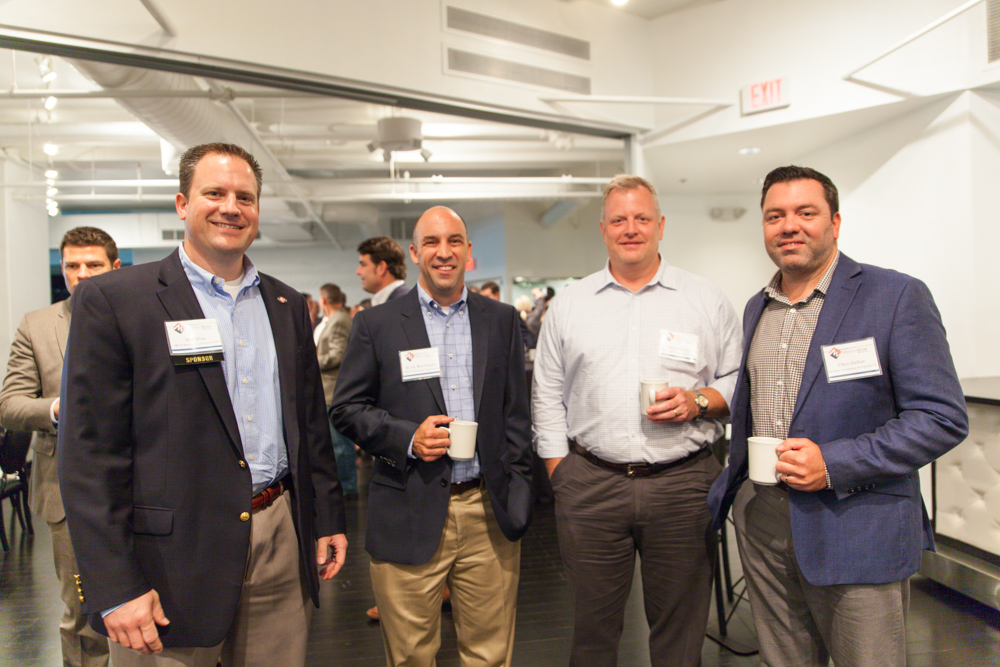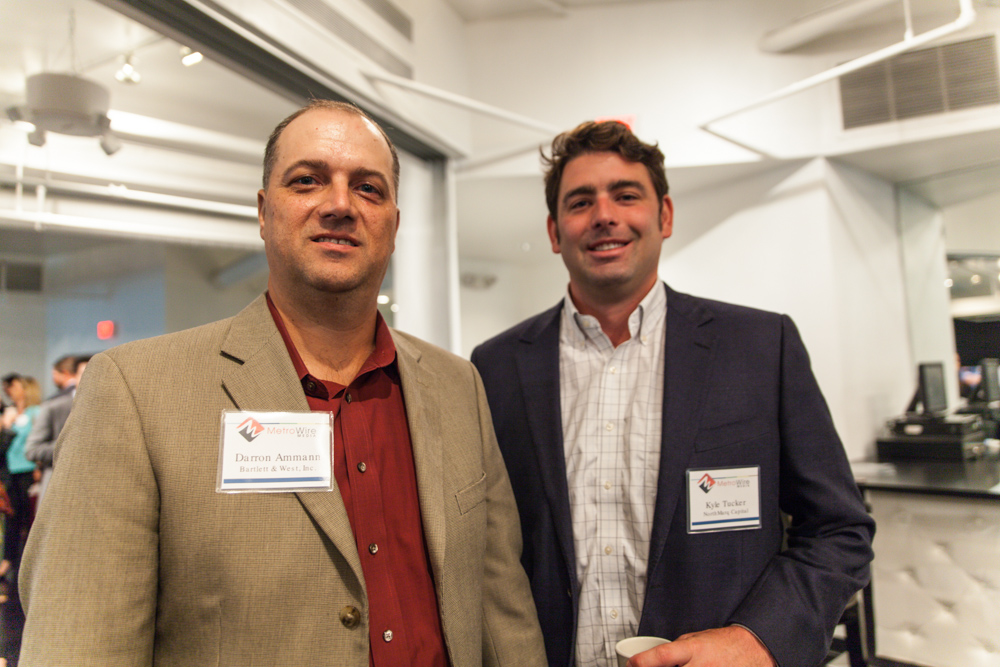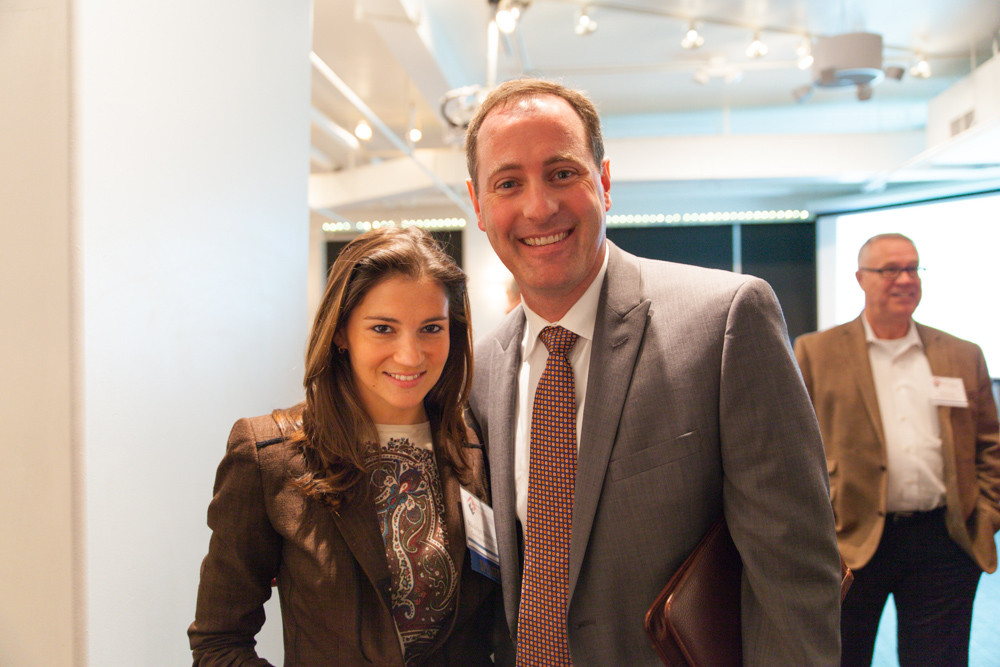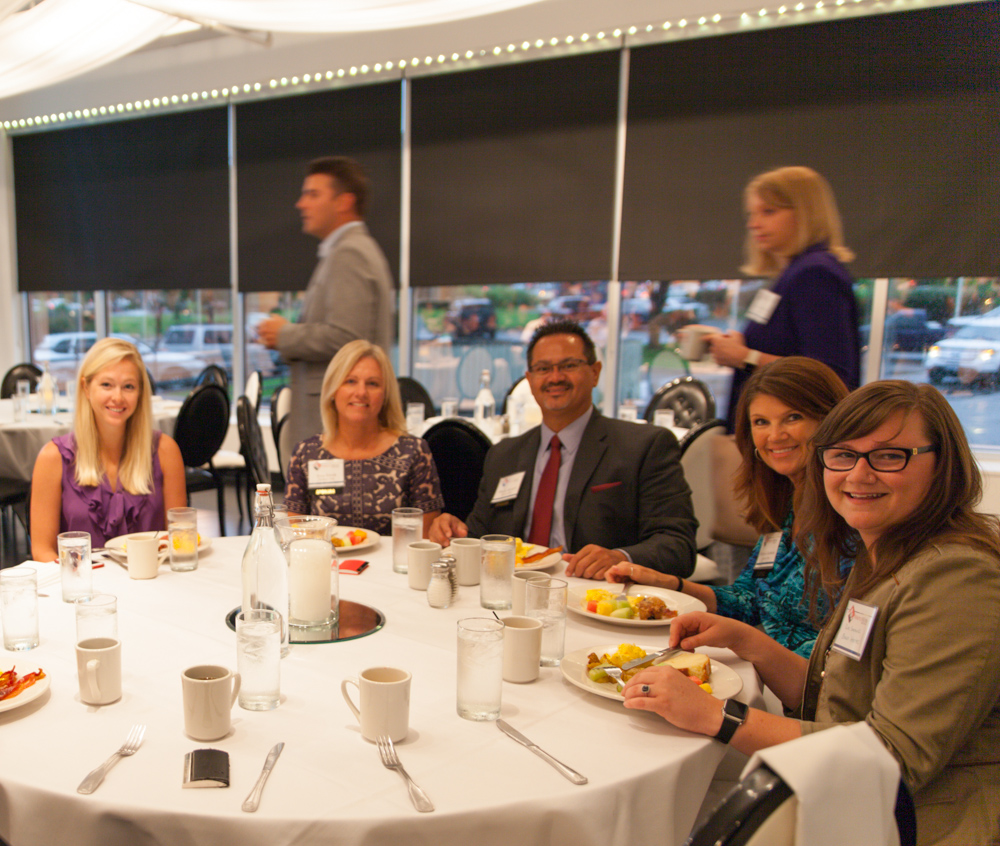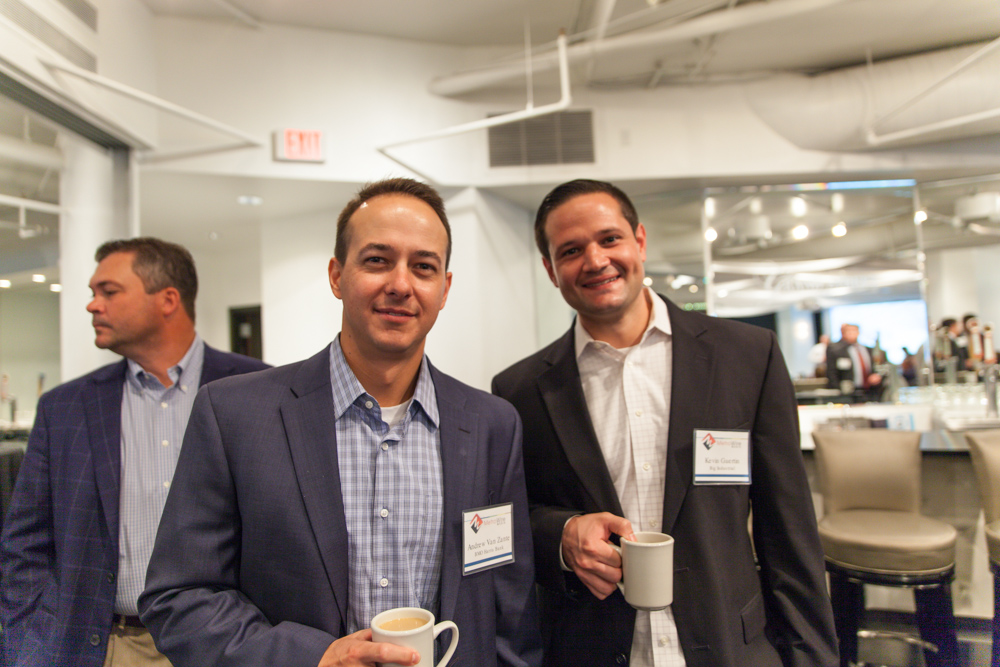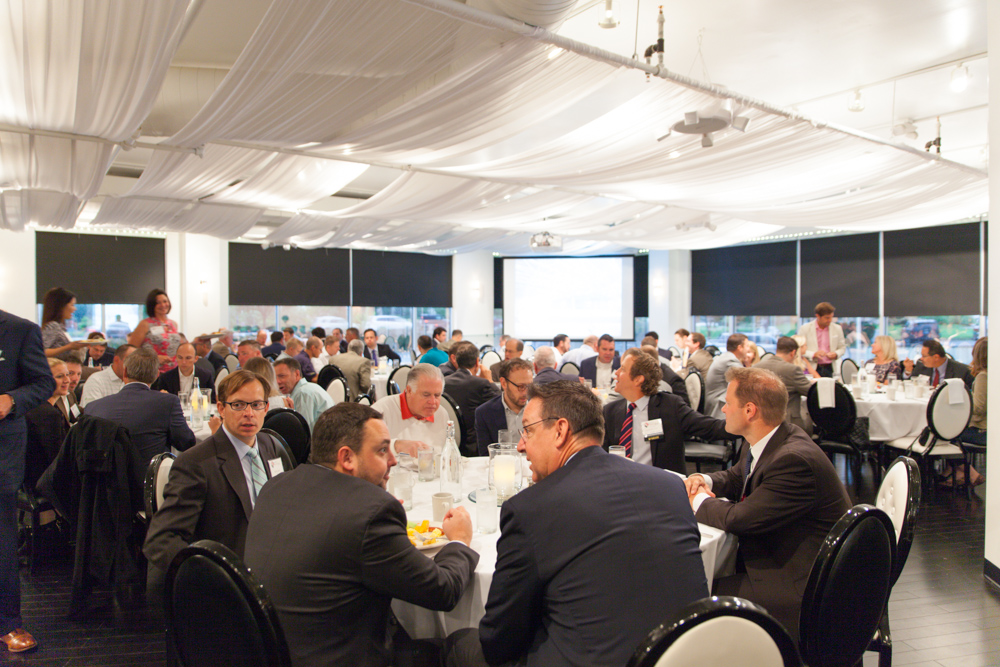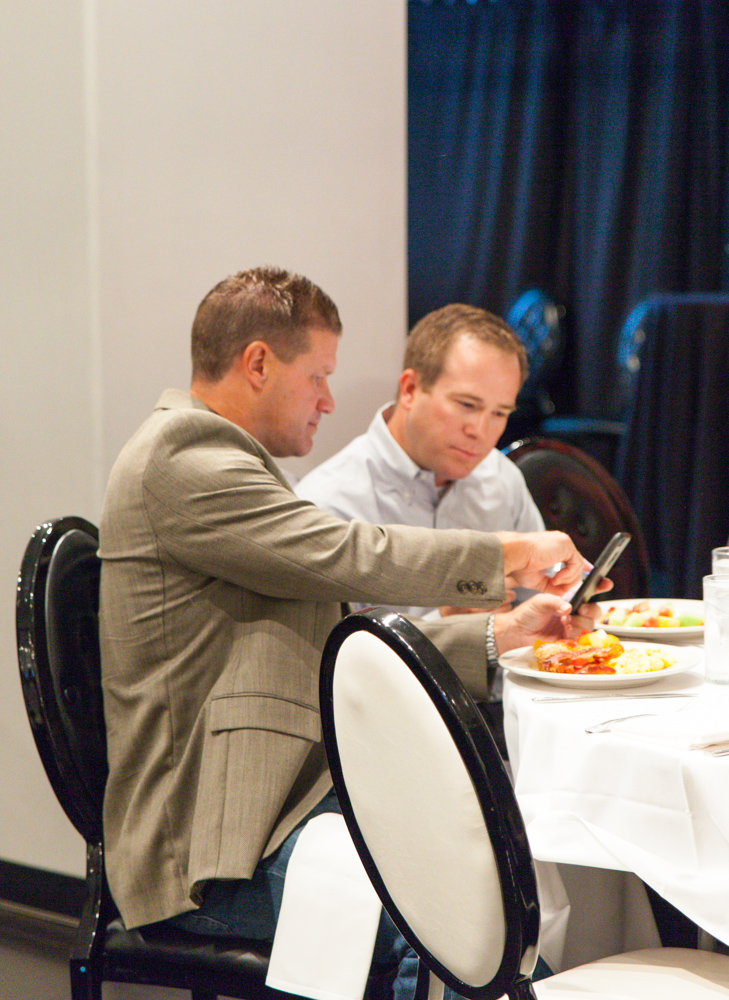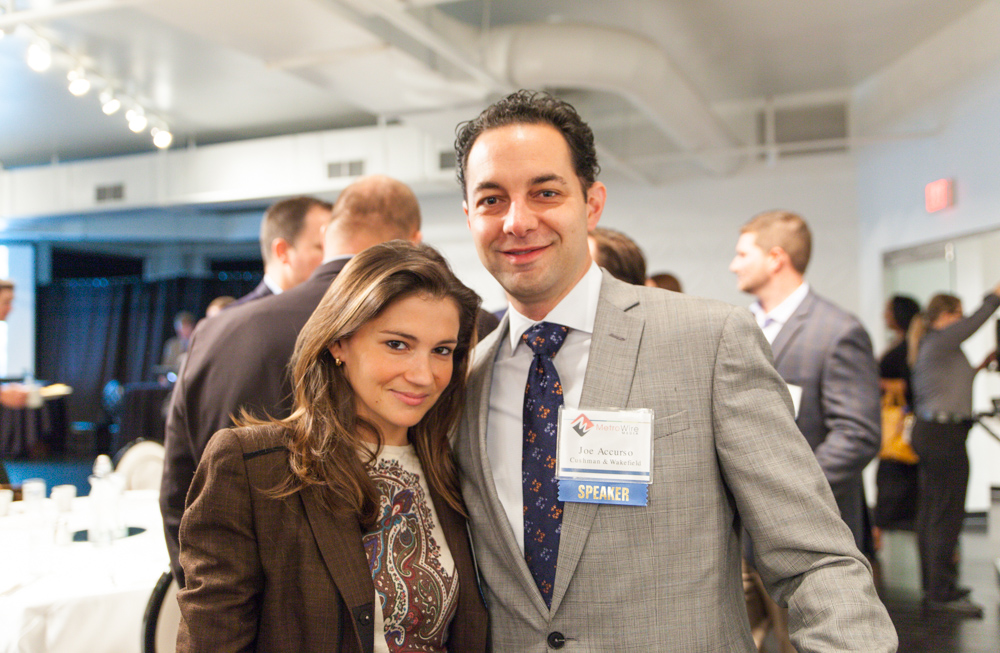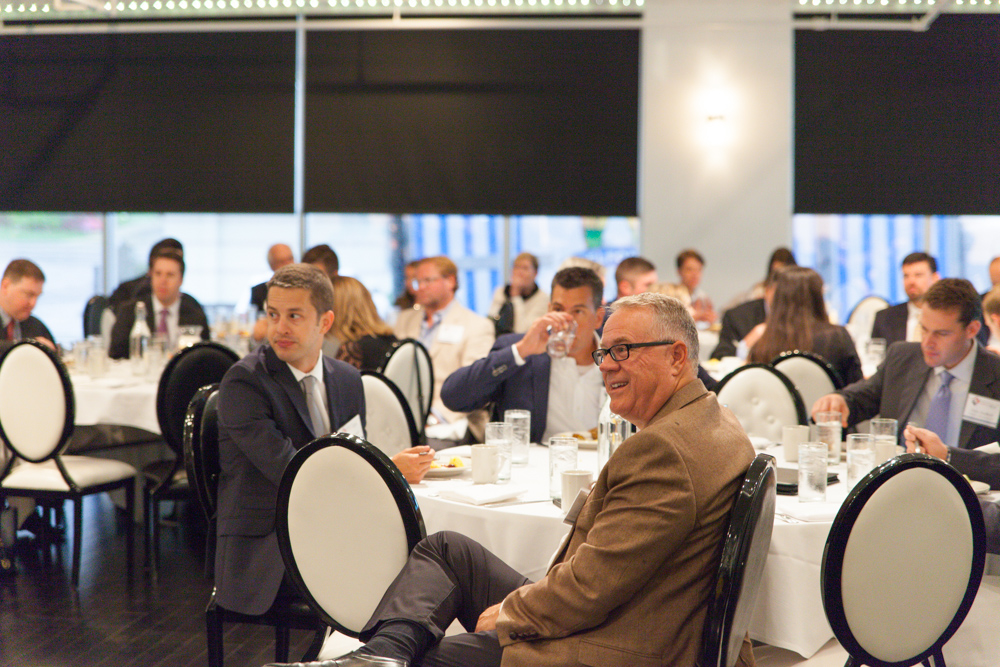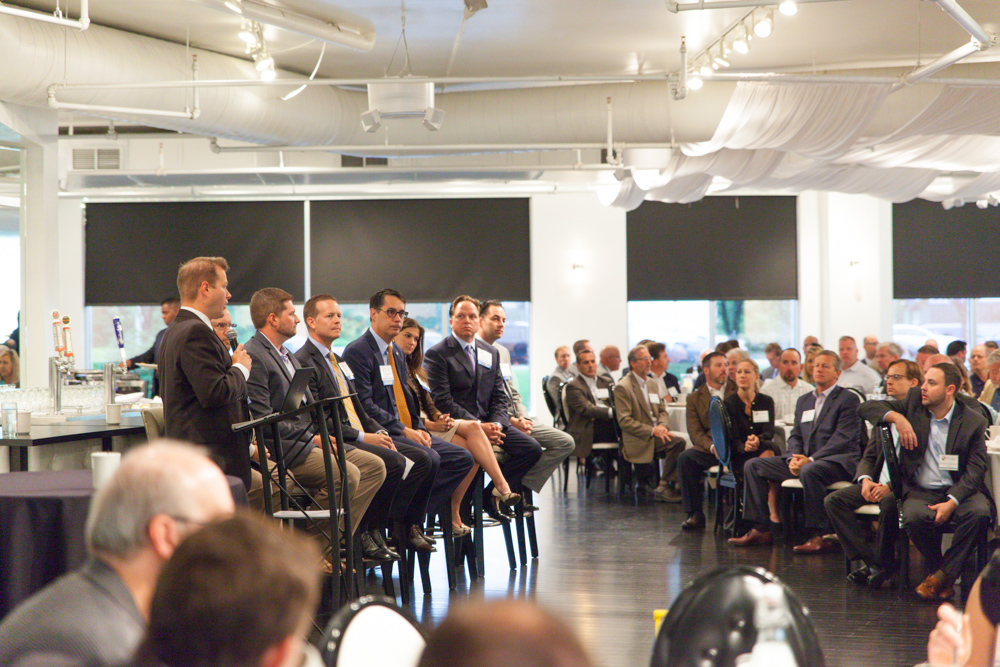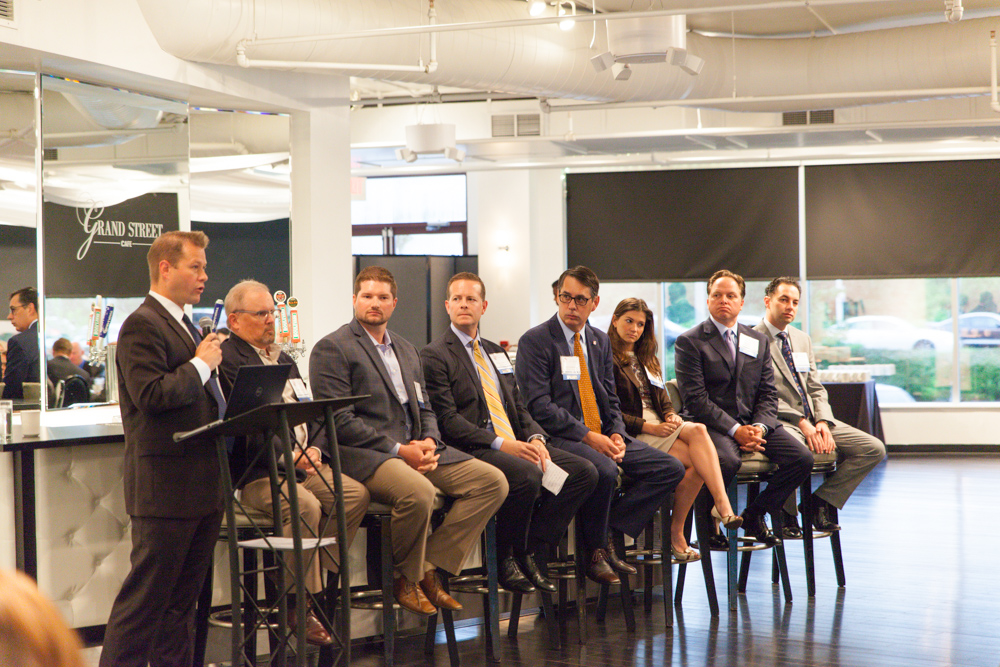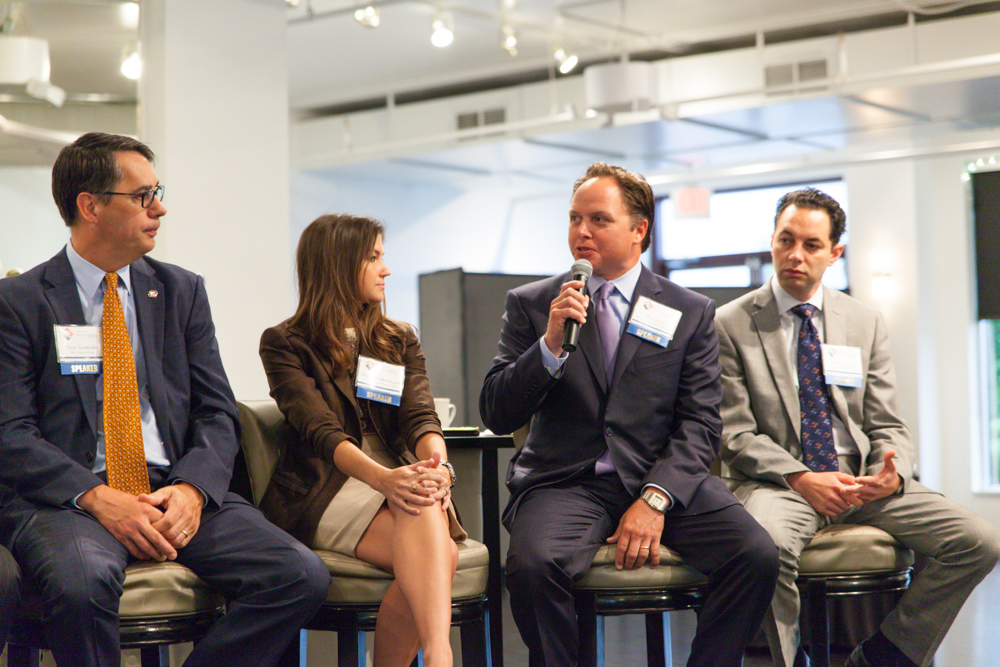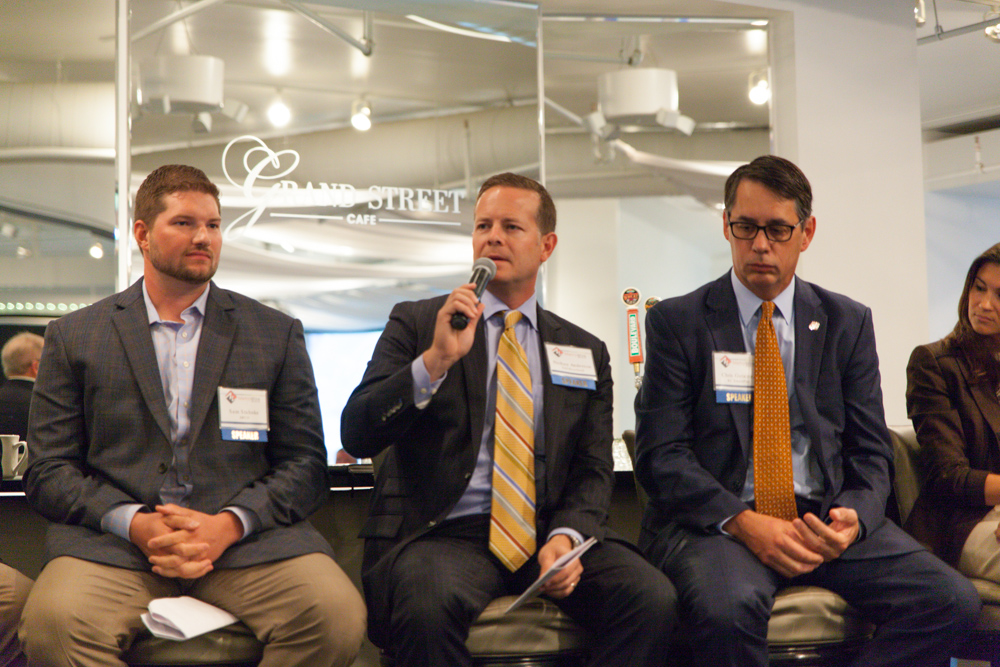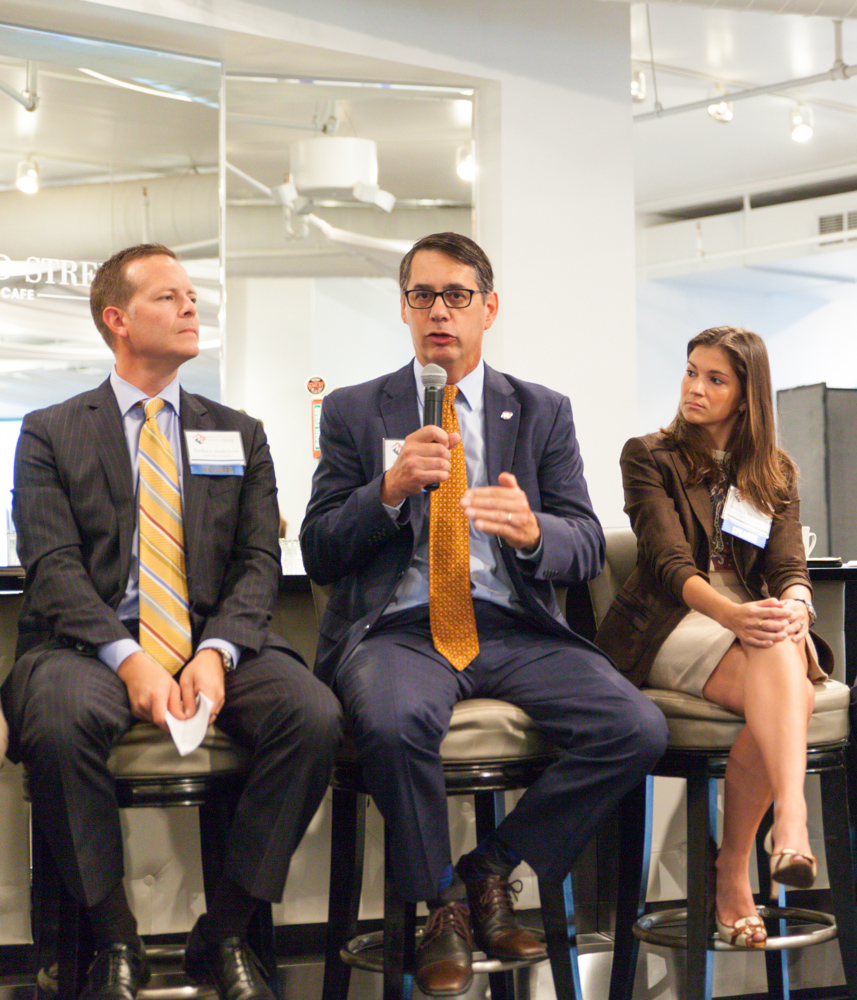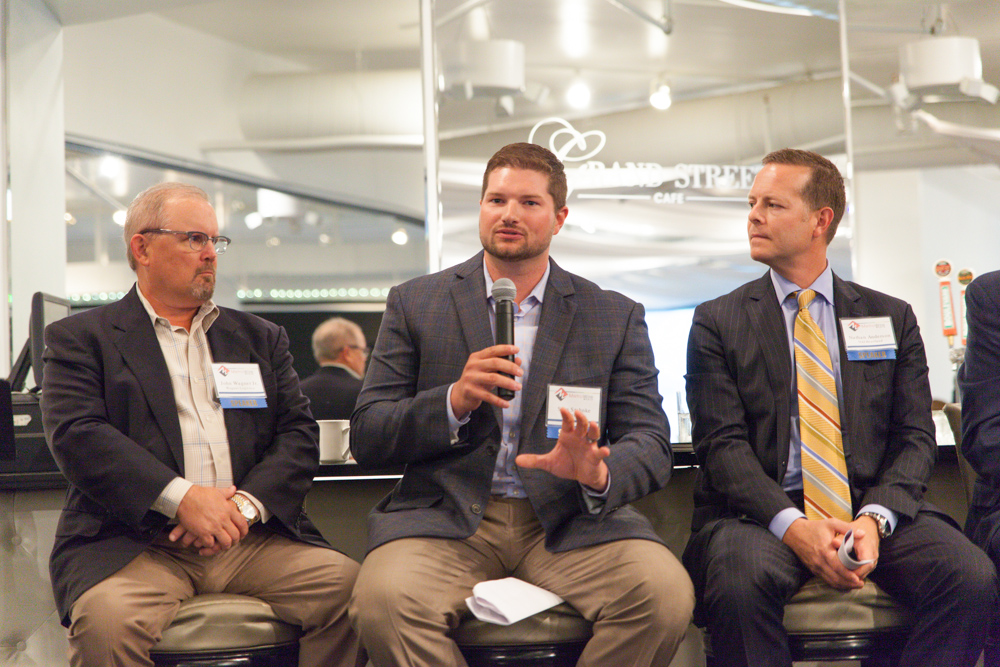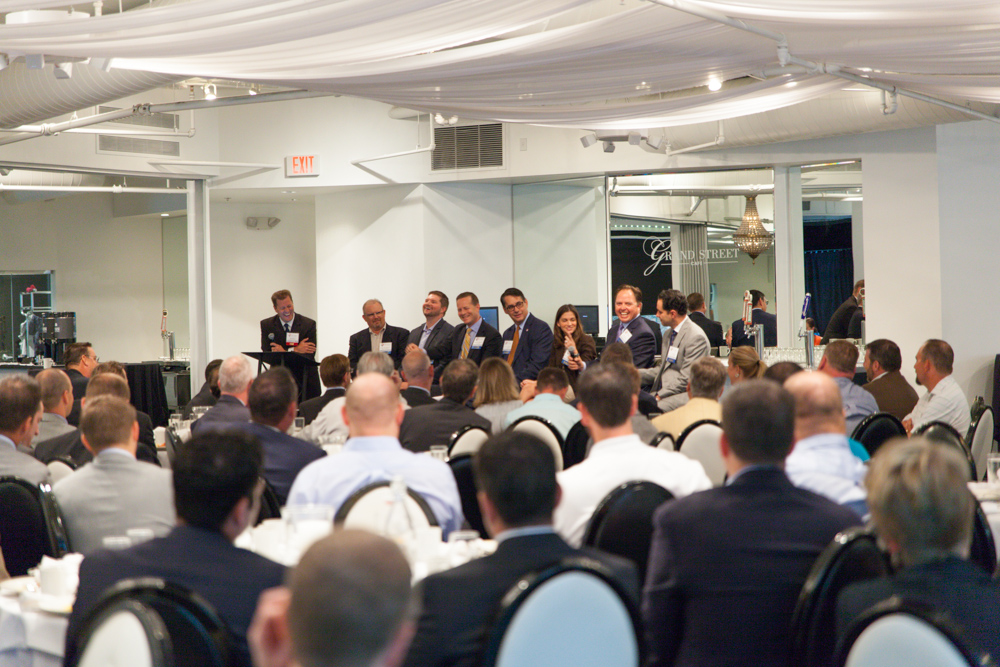Back row: Doug Bates, Grandbridge Real Estate Capital; Sam Stahnke, ARCO Construction; Chris Gutierrez, KC SmartPort; Joe Accurso, Cushman & Wakefield; Nathan Anderson, NAI Heartland; Mark Long, Newmark Grubb Zimmer. Front row: John Wagner, Wagner Industries; and Madelyn Montague, Centerpoint Properties. Photo by Jacia Phillips.
Local and regional experts last week engaged in a thought-provoking discussion on the state of the local industrial market at the 2016 Industrial Summit, hosted by MetroWireMedia. The event was supported by generous sponsors: Grandbridge Real Estate Capital, ARCO Construction, Stewart Title, GBA Architects + Engineers, Citizens Bank & Trust, Centerpoint Properties, Candid Marketing + Communications, Newmark Grubb Zimmer, Cushman & Wakefield, Design Mechanical and KC SmartPort. Here’s a look back at a snapshot of that conversation.
E-COMMERCE
Maddie Montague is the development manager at Centerpoint Properties, while Joe Accurso is a VP at Cushman & Wakefield. Photo by Jacia Phillips.
In 2012, Kansas City saw an average of 3 million square feet of new industrial construction. To put growth in perspective, the metro today stands at an average of 5 million new square feet every year.
It’s almost entirely thanks to e-commerce, according to Cushman & Wakefield’s Joe Accurso, and he doesn’t see this momentum slowing down anytime soon. Here’s his logic: In 2012, online sales only made up for 5.3 percent of total retail sales. While that figure has grown by nearly 50 percent, online sales still only make up 8.1 percent of total retail sales, leaving plenty of room for growth.
“Who doesn’t think that won’t double or triple in the next five years?” he said. “I think you’ll continue to see people as the younger generation, kids in college, who have never not had a tablet or phone, they aren’t going to go to Target as much as they will Amazon.”
INVESTMENT TRENDS
Pete Fullerton of the KC Aviation Department with Sarah Schiltz and Josh Beck of MarksNelson. Photo by Jacia Phillips.
Mark Long, principal at Newmark Grubb Zimmer, is seeing a significant change in real estate investment trends. While Hugh Zimmer still owns the first industrial building he ever built, today most owners have a much shorter hold time on their investments. Tenants are no longer signing 10- or 20-year leases on brand new space; Lease terms are growing shorter and forcing investors are handling their real estate differently.
One thing Long hasn’t seen change in Kansas City’s industrial realm is the name and number of active local developers. He continues to see the same names (read: Karbanks and Zimmers) dominate the landscape.
That’s because large, institutional buyers are afraid of Kansas City, says Nathan Anderson of NAI Heartland. Any that have come here are trying to get out, he says, with a nod companies like Prologis and First National who entered the local market and quickly reversed course.
“For a long time those groups would not come here because they had no land position and to get it they either overpaid for land or overpaid for a portfolio,” he said. “These are publicly traded groups that for some reason, can’t get a strong enough foothold in Kansas City.”
This makes Kansas City unique, he says, because in cities like St. Louis or Denver, you’re competing with large, institutional buyers.
CHALLENGES
Chris Gutierrez says his main concern about Kansas City is its shrinking number of workers for local industrial jobs. Photo by Jacia Phillips.
Chris Gutierrez of KC SmartPort knows that an industrial company’s biggest costs are in transportation. Kansas City’s low transportation costs are a big driver of the growth we’re seeing locally, he says. However, with such unprecedented growth, Kansas City is struggling to supply enough workers to fulfill demand.
“Our workforce keeps me up at night,” he says. “We’re going to keep bringing new companies in and that won’t stop, but we’ve got to stay in front of this issue.”
RELATED: Behind industrial growth, KC labor market is bleak
It’s not that Kansas City isn’t home to a sufficient population of workers, he says, but rather that this talent pool needs to be better connected to employment opportunities via public transportation. He also wants to see the industry and educational institutions join forces and communicate the career possibilities within the field.
INCENTIVES
Nathan Anderson, president of NAI Heartland, says that outside investors are afraid of Kansas City. Photo by Jacia Phillips.
While the topic of financial incentives continues to be a hot button issue in Kansas City, many panelists maintain that the tools remain necessary. Anderson says that he spends about 80 percent of his time with local tenants who want to move, however most of them want to stay in the immediate vicinity.
“Most of the time, you have to push a user to open their mind to the idea that there might be another city that would serve them better,” Anderson said. “When you look at the incentives generated from moving 150 jobs across to the state line, it can be a seven-figure bottom line move for the owner of that company. If they can get a million dollar payday by moving 15 minutes away, they’re going to do it.”
Gutierrez contends that while Kansas City may be generous with incentives, the metro as a whole still remains competitive with other states and regions. Ultimately, he says, clients expect incentive deals to be on the table, and they’re looking for the quickest avenue to cash.
Madelyn Montague of Centerpoint Properties says her firm recently used incentives in an unprecedented way in Kansas City when it applied for tax exemption and was awarded 100 percent abatement for 12 years.
“In order for us to remain competitive, we took steps for a tax exemption after the building was complete, which was really the first in history in Kansas City. I think it’ll make a big difference,” Montague said. “It’s always the first thing I ask on any tour: ‘What’s the tax exemption?’”
LOOKING AHEAD
Andrew VanZante of BMO Harris Bank and Kevin Guertin of Big Industrial. Photo by Jacia Phillips.
Accurso predicts that the Kansas City metro will continue to see industrial warehouse deals above 300 to 400,000 square feet for e-commerce tenants. In fact, he’s working with Amazon Logistics on its “last mile strategy,” wherein the company is buying or building industrial properties in urban cores, stocking up on Boeings and delivery vans, and hiring people who will soon replace the UPS delivery person.
“Soon instead of UPS, you’ll have an Amazon guy at your front door within 2 hours,” Accurso said. “But he won’t leave your package on the doorstep. He’ll wait to shake your hand, and that’s how they’ll differentiate.”
It’s no modest move. Amazon is pouring more than $20 billion into this same-day delivery service. Accurso says in 2017, the company will open more than 120 Amazon Logistics delivery service locations around the country; The second round of centers will be located in different pockets of the metro like Liberty and Lee’s Summit.
While Long says he’s moving quickly to keep up with the activity and the pace of change, he still relies on fundamentals of commercial real estate .
“I spend a lot of energy figuring out how to deal with change,” he said. “I’ve certainly adapted to a lot of change, but certainly the tried and true techniques still make sense: you’ve got to get out there and be involved.”
But with the hot state of the market, he’s eager to keep up.
“The reality is that I’m running pretty fast and sleeping well.”
Interested in participating in our next event? On November 9, MetroWireMedia is hosting the 2016 Health Care Summit, sponsored by Turner Construction and Pulse Design Group. Contact us for more information.
GALLERY PHOTOS
Photos by Jacia Phillips, Architectural Photography.



